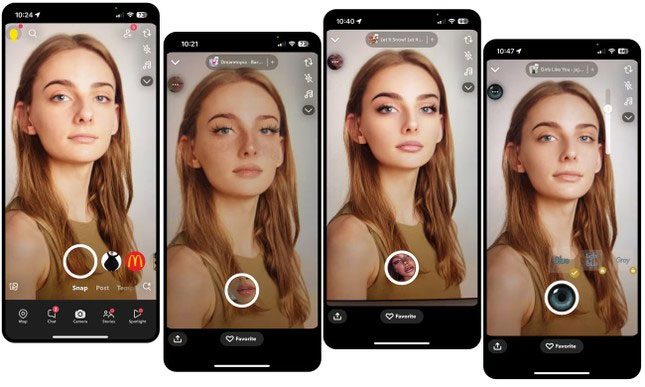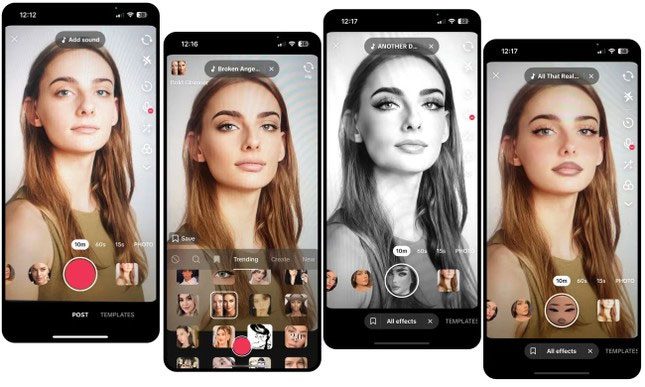Studies show that many young people are increasingly self-conscious about their appearance due to filters continuously altering faces in a cosmetic surgery-like manner.
With just a click on the “Glossy Babe” filter, a teenage girl’s face is slightly elongated, her nose appears slimmer, and a layer of freckles is scattered across her cheeks. Next, the “Glow Makeup” filter removes all skin imperfections, making her lips look plump and extending her eyelashes beyond the capabilities of makeup. With a third click, her face returns to reality.
Hundreds of millions of people are currently using beauty filters to change their appearance on apps like Snapchat, Instagram, and TikTok. This week, TikTok announced new restrictions on children’s access worldwide to filters that mimic the effects of cosmetic surgery.

Snapchat Beauty Filter (left to right): original photo, Glossy Babe, Glow Makeup, and Eyelenses.
This new regulation comes after a survey involving nearly 200 teenagers and parents in the UK, the US, and other countries, which revealed that girls are “more likely to feel insecure” when using social media.
Concerns are growing about the impact of technology on mental health, and this is no small issue: TikTok alone has around 1 billion users. An upcoming study by Professor Sonia Livingstone, a social psychologist at the London School of Economics (UK), argues that social pressure arising from edited images on social media can negatively impact mental health even more than witnessing violence.
Hundreds of millions are using beauty filters daily—features such as reshaping noses, whitening teeth, and enlarging eyes. Dr. Claire Pescott, a lecturer at the University of South Wales (UK), who has studied children aged 10 to 11, agrees that the impact of comparison on social media is alarming. In her study, a child dissatisfied with her appearance told Dr. Pescott: “I wish I had a filter on right now.”
“Education focuses on safe internet use, avoiding scams or exploitation. But the reality is that the danger lies within us. Comparing oneself to others significantly impacts emotions,” she said.

TikTok Effects Filter (left to right): original photo, Bold Glamour, BW x Drama Lashes, and Roblox Makeup.
However, some oppose restrictions on beauty effects, viewing them as part of their online identity. Olga Isupova, a Russian artist living in Greece who specializes in designing filters, stated that these measures are “absurd.” She added that having a second face is essential to being “multifaceted” in the digital age.
“A person can live their normal life, but that life will look different online. That’s why we need a filtered face for our social media accounts. For many, social media is a very competitive arena. For them, it’s not just for entertainment but also a place to enhance their lives and earn money for the future,” she said.
TikTok’s age restrictions on certain beauty filters are unlikely to resolve the issue quickly. According to the UK media regulator Ofcom, one in five people aged 8 to 16 have lied on social apps about being over 18. Stricter age verification rules won’t take effect until next year.
Numerous studies have highlighted the risks of beauty filters for teenagers. Last month, a small study of schoolgirls using Snapchat in Delhi (India) found that most of them “lacked self-esteem and felt powerless when comparing their natural appearance to edited images.” A 2022 survey on the perspectives of over 300 Belgian teenagers revealed that using facial filters made them consider cosmetic surgery.
“Some children are resilient and reject these images, but more vulnerable children tend to feel worse when they see them. We have ample evidence that teenage girls are more likely to feel insecure about their appearance,” said Livingstone.
Jeremy Bailenson, founding director of the Virtual Human Interaction Lab at Stanford University (US), stated that the social and psychological consequences of extreme beauty filters require more experimental research. “There needs to be a balance between regulation and health concerns. Even small changes to virtual avatars can quickly become tools we rely on, such as the ‘beautify’ feature on Zoom and other online work platforms,” he said.
Meta, the parent company of Instagram, stated that they walk a fine line between safety and personal expression with their filters. They have consulted mental health experts and banned filters that directly encourage cosmetic surgery—such as those projecting surgical lines onto users’ faces or advertising procedures.
Meanwhile, TikTok stated there is a clear distinction between effects like filters that add animal ears and filters designed to alter appearance, and that teenagers and parents have raised concerns about appearance-altering effects. Additionally, they will work to raise awareness among filter designers “about some unintended outcomes that certain effects may cause.”


















































